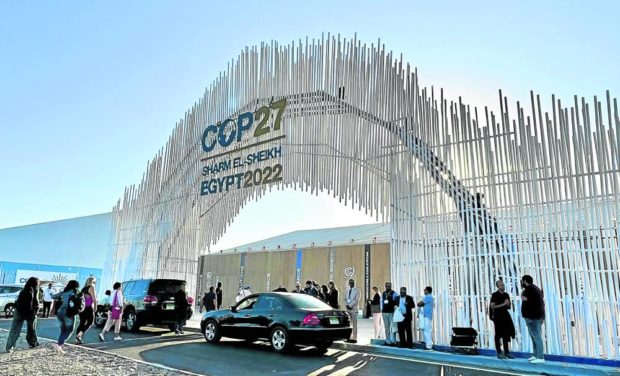
A week before the United Nations-backed climate conference, the Philippines was hit by Tropical Storm Paeng (international name: Nalgae), leaving over a hundred people dead, causing landslides and widespread flooding.
Hit by an average of 20 typhoons a year, the Philippines is now the world’s most disaster-prone country, according to the World Risk Report 2022.
Civil society groups said the Philippines and other vulnerable countries bearing the brunt of extreme weather events must call on governments to push loss and damage finance on top of the agenda at this year’s 27th Conference of Parties (COP27) to the UN Framework Convention on Climate Change. (See related story in World, Page B3).
But at the opening of COP27, countries have finally agreed to discuss loss and damage funding on the COP27 agenda since the adoption of the UN climate convention in 1994.
“I expect the Philippine delegation to the climate talks to be at the forefront of the loss and damage discussions, which is the most important issue for our country in this meeting,” Tony La Viña, associate director for climate policy and international relations of the Manila Observatory, told the Inquirer.
‘Different from past talks’
According to La Viña, a former lead negotiator of the country, he has high hopes with the leadership of the Philippine delegation under Environment Secretary Toni Yulo Loyzaga since she is also a climate change expert and has particular interest in resilience and addressing climate impacts.
La Viña is attending COP27 as a climate justice advocate, together with his colleagues from the Manila Observatory led by its executive director, Fr. Jett Villarin, SJ.
“I hope the Philippine delegation would also seek assistance from us from the civil society who are veterans of the negotiations process,” he said.
In last year’s climate talks in Glasgow, civil society groups complained of exclusion and the lack of transparency in the strategy and decision-making of the Philippine delegation.
“The presence of many civil society representatives makes this COP different from the past climate talks,” Rodne Galicha, lead convener of the civil society network Aksyon Klima Pilipinas, said at this year’s COP.
Christian Aid’s advocacy partner Jessica Dator-Bercilla agreed, saying the Philippine delegation must engage those who have been actively involved in climate negotiations so that the country can have an institutional documentation of the key Philippine positions around issues that matter to the Philippines such as loss and damage.
Transparency
Gerry Arances, executive director of Center for Energy, Ecology and Development, said: “While the level of transparency from the government on the official delegation’s agenda and composition has been far from satisfactory, one can hope that the pronounced priorities of DENR (Department of Environment and Natural Resources) Secretary Loyzaga and her background in climate science and civil society would make its mark in the engagements of the delegation.”
He also noted that the policy directions of the new administration, such as the President’s marching orders to ramp up the gas buildup after over a decade of coal expansion, require civic movements and communities to keep watch over the government representatives and remind them of our need for ambitious climate action.
Loyzaga, in a statement, said: “The Philippine delegation in the following days will continue to assert and safeguard the country’s interest in climate change negotiations, ensuring that we receive the appropriate support and assistance as a country vulnerable to climate change.”
The delegation consists of representatives and negotiators from the DENR, Department of Finance, Department of Foreign Affairs, Department of Agriculture, and Department of Energy, with advisers from climate scientists and development experts.
In the Philippines, several youth climate advocates are also actively lobbying government delegates to integrate their key recommendations into the country’s position on critical climate issues.
“We never forget to demand accountability and transparency from the government and businesses for their statements and actions in the context of climate justice,” said John Leo Algo, deputy executive director of Living Laudato Si Philippines.
Sea level rise
Meanwhile, the Department of Science and Technology (DOST) said the country needs to ramp up its disaster preparedness and resilience measures, since it now faces rising sea levels and increased risk of tsunamis.
According to recent data from the agency, over 80 percent of the country’s 81 provinces are exposed to tsunamis. This includes 832 coastal municipalities and 25 coastal cities housing 62 percent of the country’s population.
Of the many climate-related threats coastal communities face, tsunamis are the rarest as they could only happen during earthquakes.
But the DOST urged both national and local governments to “not be complacent” as rising sea levels also raise the risk of exposure.
“Tsunami hazards can result in disaster losses, [but] we can reduce disaster risks. Information, tools, systems and plans are available for communities to be safer,” said Joan Salcedo, DOST supervising science research specialist.
—WITH A REPORT FROM KRIXIA SUBINGSUBING INQ
RELATED STORIES
COP27: Financing for climate damage gets a foot in the door
COP27 summit opens as world races against climate clock